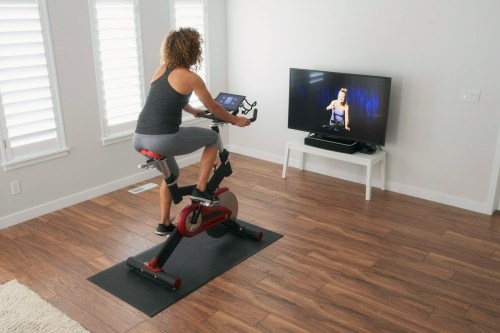The race for accessible at-home digital fitness is on—and Echelon is out front
When it comes to buying Echelon vs Peloton, there are a few things to know, including the fact that they'll soon share designer Eric Villency.

These days, everyone in the fitness world wants to be the Peloton of something—hardly a surprise, given the seven-year-old company’s $8.1 billion valuation earlier this year (despite the fact that things haven’t been going quite as well as expected since its IPO on September 25). Hydrow brought on-demand rowing to your home, Tonal did it with strength training, and FightCamp did it with boxing. But every single one of those options will run you nearly $2,000 or more, which is why Echelon set out to fill the white space to become the Peloton of affordable at-home fitness.
The brand launched in early 2018 with the mission to make fitness technology more accessible than what has traditionally been offered on the market. Its first smart product, the Connect Bike, pairs with an app on your phone or tablet so that you can stream live classes, track your metrics, and compete with other riders (sound familiar?). But unlike Peloton, which rings up at $2,495, Echelon’s option will only leave an $800 dent in your wallet (keep in mind that neither of these prices include the cost of classes, which require an additional $39 monthly membership for both platforms).
Despite being more affordable, reviews for Echelon’s bikes—which now include three slightly more advanced bikes that retail for $1,039, $1,239, and $1,639–have aired largely on the side of “you get what you pay for.” They don’t come with a built-in screen (you have to attach your phone or tablet to the dock in order to stream the workouts), and the bikes are lighter and less sturdy than some of their competitors, but that could all change soon thanks to the brand’s newly announced partnership with designer Eric Villency.
Even if you haven’t heard of Villency before, you’ve almost definitely reaped the benefits of his innovative mind—most likely while tapping it back in a spin class. He’s responsible for the designs of the iconic Peloton and SoulCycle bikes (as well as Equinox apparel and Organic Avenue’s juice bottles, among other things that have definitely found a place in your wellness routine)—in 2013, we called him “The Wizard of Wellness Design,” and he’s continued to live up to the title over the last six years. In 2018, he partnered with Chicago’s Studio Three to develop a line of equipment that includes a $1,900 at-home bike, and now he’s doing the same with Echelon…but at a more affordable price-point.
“Echelon’s success has been driven by providing a great fitness experience at tremendous value and we believe that good design isn’t determined by price and it doesn’t have to be expensive,” Villency said in a statement. “We look forward to enhancing their designs and helping take the rider experience to the next level. Our philosophies align, great design and fitness should be accessible.” In addition to the bikes, Echelon also offers a slightly-more-affordable take on The Mirror that clocks in at $999 (compared to Mirror’s $1,495 price tag), as well as a new touch-screen version of the technology retailing for $1,639.
The big mission of equalizing and making fitness technology accessible might be an uphill battle, however. Earlier this week, Peloton Interactive Inc. filed a lawsuit against Echelon Fitness LLC for copyright and patent infringement. Peloton has accused Echelon of attempting to take a “free ride” off of its technology (if you got a kick of the term “free ride,” being used in there, well, #same), and called them out for appropriating their intellectual property.
All of this inside-baseball is enough to make many of our heads spin, but what happens in these lawsuits is important because it’s going to create the foundation for the way we sweat—and more importantly, the way we sweat at home—moving forward. By and large, there’s still a significant buy-in required to own one of these pieces of equipment ($800 may be more affordable than $2,495, but either of these hardly qualify as “affordable”). Until the “for somes” truly do become accessible for all, we’re guessing that we’ll continue to see brands vie for the mass market in a way that Orangetheory has to Barry’s Bootcamp or Core Power has to Laughing Lotus.
As for Echelon, we’re excited to see what kind of innovation a partnership with “The Wizard of Wellness Design” will bring. Because if “getting what you pay for” means getting Peloton-level equipment for a third of a price, that might just be something worth investing in.
Speaking of home fitness innovation, Mirror just launched a revolutionary personal training program. And as digital fitness becomes more of a staple in all of our lives, expect to see a whole lot of changes in your traditional gym.
Sign Up for Our Daily Newsletter
Get all the latest in wellness, trends, food, fitness, beauty, and more delivered right to your inbox.
Got it, you've been added to our email list.










